July 2023
In this edition:
- Does BC Hydro have enough power to meet demand? (...and other burning questions from our local government partners)
- BC Hydro's cooling initiatives for vulnerable residents
- Meet Sarah Dal Santo and Sara Hyland, Tsleil-Waututh Nation energy managers
- BCIT teaches air-source heat pump installation skills
- Key findings from our CEMx event
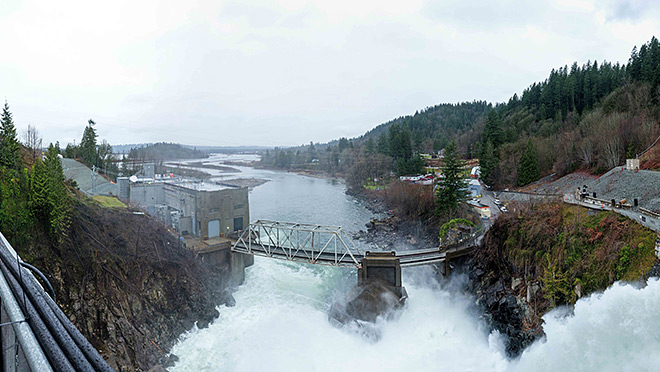
Does BC Hydro have enough power to meet demand? (...and other burning questions from our local government partners)
Electrification is one of the most powerful tools we have to reduce greenhouse gas emissions. But does BC Hydro have enough electricity to run all the heat pumps and electric vehicles we'll need?
A new report, Electrifying British Columbia, is here to provide straight answers to frequently asked questions about the energy transition. Introba and Bright Future Studio worked with BC Hydro, ZEBx, and Community Energy Managers from the Township of Langley, Metro Vancouver and Saanich to develop and provide local government staff with clear, accessible, and accurate information on electrification in B.C. The goal of the report is to provide resources to support candid conversations on the benefits, risks, and implications of electrification, including considerations of grid capacity and reliability.
The questions in the report were developed by surveying twelve local governments from across B.C.
Topics include:
- Will BC Hydro have enough power to support the widespread electrification of homes, buildings, and industry?
- How will BC Hydro meet increased electricity demand?
- How can individuals and communities produce energy to feed into the grid?
- What's the role and potential of energy storage technologies?
- What are the climate impacts associated with electricity imports?
- How is BC Hydro addressing costs and timelines associated with electrical service upgrades?
- Will homeowners with electric heating stay safe through an extended outage?
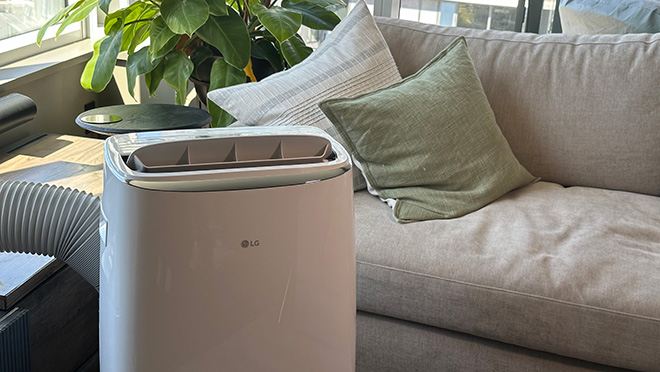
Cooling initiatives for vulnerable residents
The climate crisis is increasing overheating risks for B.C. residents, especially for low-income and medically vulnerable community members. We've been providing funding for portable air conditioning units to residents who are at increased risk of health effects from heat waves, including partnerships with the following organizations:
- BC Housing & BC Non-Profit Housing Association
- Aboriginal Housing Management Association
- Office of the Chief Medical Health Officer, Vancouver Coastal Health
- Praxis Spinal Cord Institute and Technology for Living
In partnership with the Government of B.C., we're supporting the installation of portable AC units and energy coaching for income qualified and medically heat vulnerable households.
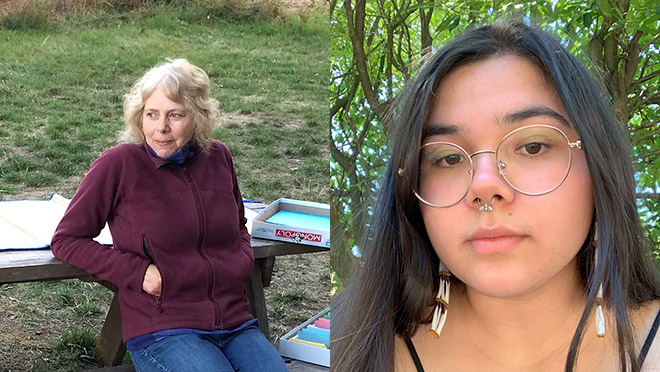
Meet Sarah Dal Santo and Sara Hyland, Tsleil-Waututh Nation energy managers
We recently met with Sarah Dal Santo and Sara Hyland, səlilwətaɬ (Tsleil-Waututh Nation, TWN) energy managers who are co-funded through our new Indigenous Energy Management program, and had the opportunity to learn about their work. Together, Sarah and Sara are working on a number of innovative energy projects on Tsleil-Waututh reserve lands.
Advancing energy retrofits for community homes has been a key aspect of their work, with a focus on promoting building envelope improvements, upgraded windows, doors, insulation and ventilation. Sara Hyland explained that this work is crucial because "a lot of our buildings weren't built to proper standards. A lot of our Nation members' homes don't have adequate ventilation and air quality." For new buildings, Sarah Dal Santo added that Council recently approved an energy-efficient, low carbon buildings policy which is going to change the way new buildings are constructed to improve energy and carbon reduction based on the Energy Step Code and the Zero Carbon Step Code. TWN is also in the final stages of completing a Community Energy Plan that includes a greenhouse gas reductions target.
Solar energy projects have a particularly strong presence in the community. In 2015, TWN installed a 40 panel solar PV array (aerial mounted, rotating system) that provides renewable energy to offset energy use in the TWN Child & Family Centre. In 2020, TWN installed a 338-panel ground-mounted solar PV array that provides renewable energy to help offset energy use in their Administrative and Health Care Centre building. It's the largest ground-mounted solar project in Metro Vancouver to date. In 2021, TWN installed four Level 2 EV charging stations in the building's parking lot which are available for community use.
"We want to make sure our community has the infrastructure ready to handle the transition to electric vehicles and that we are leaders in clean energy." Dal Santo adds that "We're taking renewable energy seriously and we're seeing these as real opportunities for community members."
Their work is guided by Coast Salish laws and the səlilwətaɬ (Tsleil-Waututh Nation) stewardship policy, which embody respect and caring for the lands, water and air. Sara Hyland shared that "a lot of our culture is rooted in stewardship, and it ties back to our creation story where our first grandmother was created from the inlet. And so, if you take care of the land, it'll take care of you." Hyland adds that colonization damaged the harmony with which Indigenous people have lived on the land, but "we still have all of that knowledge, that way of being, and all of our laws. I really believe that there is no climate action without Indigenous leadership."
Community engagement has been a key aspect of Dal Santo and Hyland's work, including participatory sessions with TWN members to explore community energy values and vision for the future. According to Hyland, "Our community members take a lot of pride in being leaders in a lot of different ways, and being energy efficient is one of those." She adds that "The teaching that I've heard over and over again with leadership roles is when decisions are made, you always keep in mind the seven generations before and after you. Especially within the context of these projects, they don't just affect us as a team or as the community. The effects are broad and wide."
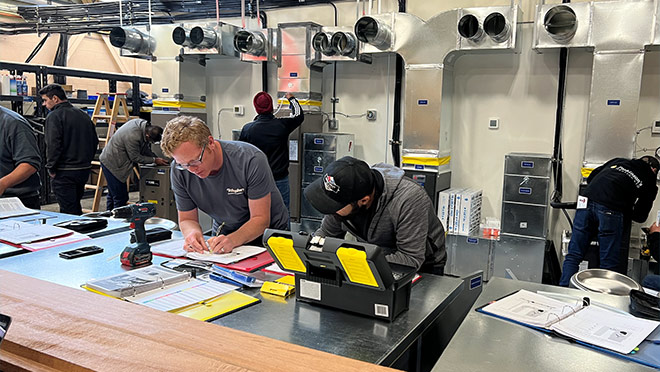
BCIT teaches air-source heat pump installation skills
Electrifying our homes will require a lot of qualified heat pump installers. BCIT's Zero Energy/Emissions Buildings Learning Centre (ZEBLC) is helping lead the way by providing a full suite of short, hands-on courses to help construction practitioners understand the building science and practices associated with the BC Zero Carbon Step Code, City of Vancouver Zero Emissions Building bylaws, BC Energy Step Code and Passive House standard.
A recent highlight was their Residential Air-Source Heat Pump Installation Skills Course, which received funding support from our Market Transformation group. Eight students attended with backgrounds in fields such as gas fitting, plumbing and sprinkler installation. The pilot course, which took place at BCIT's High-Performance Building Lab, introduced practical skills and provided hands-on experiences required for single-family residential air-source heat pump installation. Students participated by working with live and simulated equipment and learned how the quality of a heat pump installation affects its performance, available rebates, and more.
For more information about this course and its next offering, contact Mary McWilliam.
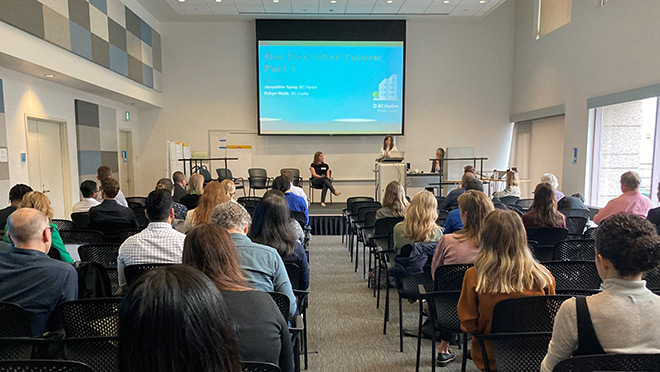
Key findings from our CEMx event
Our Market Transformation team recently held its annual event, CEMx, ("Community Energy Management Exchange"). Over two days in Vancouver, CEMx brought together 100 participants from local and provincial government, First Nations, industry associations, and BC Hydro. Our speakers showcased the great work being done across the province in building and transportation decarbonization. This year's theme was "Market Transformation to an Electrified Future".
Topics included:
- BC Hydro's vision for energizing the province, from Senior Vice President of Customer and Corporate Affairs, Diana Stephenson.
- Updates from the Government of B.C. on provincial building standards and Local Government Climate Action Program funding.
- Indigenous Energy Manager partners shared the work being done to support retrofits in Musqueam Nation and new solar and battery storage in Tsleil-Waututh Nation.
- Updates from our industry local government partners, and outcomes of projects we've funded.
- An overview of how our electrical system works, from BC Hydro's Hudson Giesbrecht.
- The climate crisis and the how we're handling the shift to electrification, from BC Hydro's Jacqueline Spray.
- Deep dives on how we're tackling the infrastructure needed to support electrification, from individual homes to the grid itself.
We received great feedback from our attendees and were glad to see so many of you in person.